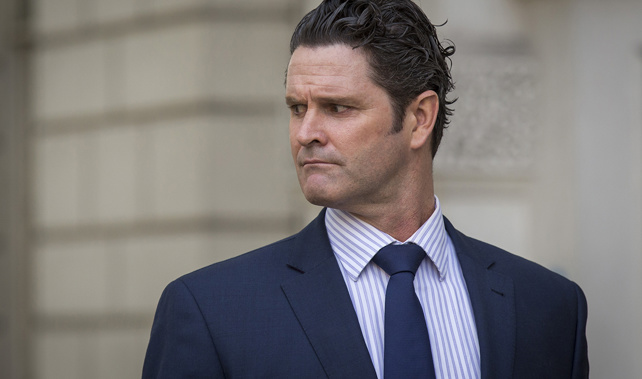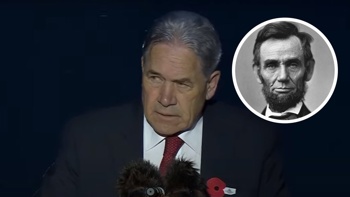
A hero, an idol, a legend - Chris Cairns was the "golden boy" of international cricket whose arrogance led him to believe he would never be caught match-fixing, a court has been told.
But he was "caught at the boundary", according to the Crown prosecutor who opened the case against him overnight.
A juror of 12 were sworn in at the Southwark Crown Court in London and then Sasha Wass, QC, laid out details of the prosecution case against Cairns on charges of perjury and perverting the course of justice.
The witnesses will give evidence in the coming weeks but the Crown prosecutor told the jury what allegations they are expected to make while on oath.
She described his "glittering career" for New Zealand which spanned 17 years, playing 62 tests and 215 one-day internationals for his country, before retiring from international cricket in January 2006.
"Mr Cairns is described by his fellow cricketers as a hero and role model; a legend. He was the golden boy in the cricket world whom every cricketer wanted to emulate."
Following his international retirement, Cairns joined the Chandigarh Lions in the Indian Cricket League, the rebel T20 competition, until he was suspended in October 2008.
The public reason given for his suspension was under performance due to an ankle injury which put him in breach of his contract.
But in the weeks and months that followed, Cairns and others were rumoured to be involved in match-fixing.
Then in January 2010, Lalit Modi, chairman of the Indian Premier League, posted this message on this Twitter page: "Chris Cairns removed from IPL auction list due to his past record of match fixing. This was done by the Governing body today."
The tweet was followed up by cricket news website, CricInfo, and then Cairns hit back by taking libel action against Modi in the High Court in the United Kingdom.
Cairns made a number of statements and gave evidence on oath, said Ms Wass.
"Mr Cairns repeatedly said in statements and confirmed on oath before the court that he had never cheated at cricket. The prosecution say this was untrue," said Ms Wass.
Cairns won the defamation case in March 2012 and Modi was ordered to pay 1.4 million pounds in damages and costs.
But Ms Wass said the judge in the libel case, Mr Justice Bean, did not hear from many of the witnesses who will give evidence in the current perjury case.
She said Cairns was not being prosecuted for manipulating a cricket game, but something far more serious - manipulating the UK justice system.
"Chris Cairns knew that he had been guilty of match fixing, he knew that he had been suspended and he knew that what Mr Modi had tweeted about him was true," said Ms Wass.
"But Mr Cairns was an arrogant individual and very sure of the power he held over the people around him.
"After all, the only people who knew for certain that Mr Cairns was engaged in match fixing were those people who had been match fixing with him. Why would they want to give evidence to that effect in court?
"So Mr Cairns had a free rein: he could protest his good name and spotless reputation to the rooftops, knowing or believing that he was untouchable."
This led Ms Wass to the second defendant, Andrew Fitch-Holland, a close friend of Cairns and a barrister by profession.
On his website, Fitch-Holland posted that he was the "lead advisor" to Cairns in the libel case despite not representing him during the trial.
"The 'lead advice' provided by Mr Fitch-Holland was something no respectable lawyer would provide: it involved trying to persuade a witness to lie during the High Court case in order to support Mr Cairns' perjured evidence," said Ms Wass.
That witness was Lou Vincent.
A former Black Cap teammate of Cairns, Vincent was also playing for the Chandigarh Lions.
Cairns asked Vincent to write a statement on his behalf for the libel case to say that he wasn't involved in match-fixing.
Vincent refused to do so and Fitch-Holland followed up with a Skype call - which Vincent recorded.
The call was played to the jury and parts of the transcript were also read to the court.
Fitch-Holland: "between you and I we all know some of what is being said is clearly true...at the end of the day just because you give a statement no one can force you to come to court, no one can force you to do anything, you know."
Vincent: "It's a big ask from me to sort of like, you say in a legal document, to say something that isn't true...it's a horrible situation because I want to be there for a mate as well and Cairnsy has been a mate, although you know like I said I am not proud of what has happened at all..."
Cairns and Fitch-Holland have been jointly charged with attempting to pervert the course of justice.
Although Cairns is not being prosecuted for match fixing, Ms Wass told the jury they must be sure that he did cheat before deciding whether he was guilty of the charges he faces.
She said the prosecution would provide "clear evidence" that he did, including statements from a number of former Black Caps teammates.
Ms Wass said these included:
• Andre Adams - Cairns openly boasting that match fixing did not matter in the ICL as it was not officially sanctioned by the International Cricket Council and no one could ever prove it.
• Shane Bond: Fellow players and umpires involved in matches with the Chandigarh Lions saw Cairns do things on the cricket pitch which "did not look right".
• Alleged approaches made by Cairns to two players, Brendon McCullum, and Lou Vincent.
The QC explained how "huge amounts" of money were involved in gambling on cricket and how matches could be manipulated through "spot fixing" and "spread betting".
Another former Black Cap teammate of Cairns, Chris Harris, will also give evidence about the time he was the captain of another ICL team, the Hyderabad Heroes.
Ms Wass said Harris remembered two specific games which he thought were peculiar.
One was a match was between the Chandigarh Lions and the Mumbai Champs in October 2008.
The Champs opened the batting and one of the batsmen just kept blocking the ball.
"He did not appear to want to score any runs. When the Chandigarh Lions came to bat, they did not score well either," said Ms Wass.
"It looked as if they were going to lose. It seemed that both sides were deliberately trying to underperform."
But one player did not follow the alleged script and scored some runs, the game changed entirely, and the Chandigarh Lions ended up winning.
The captain of the winning team would normally be happy, said Ms Wass.
"Not so with Mr Cairns. [Chris] Harris will tell you that Mr Cairns was not very pleased at all."
Ms Wass said Shane Bond also remembered the same match and Cairns' lack of enthusiasm when his team won.
"What possible reason could there be for players deliberately trying to lose a game other than the fact that bets had been placed on their losing," said Ms Wass.
"This explains why Mr Cairns was so disappointed when the wicketkeeper came to bat and actually played the game properly.
"So the first reason we say that you can be sure that match fixing was going on was because certain games were played in a suspicious way."
One of those players whom Cairns allegedly tried to recruit to match fix was Brendon McCullum.
McCullum was playing for the Kolkata Knight Riders in the ICL in 2008 and Cairns was one of his "idols", said Ms Wass.
The pair became friends and McCullum will give evidence that they once met in Cairns' room in the Sonar Hotel in Kolkata. Ms Wass said Cairns steered the conversation towards "spread betting".
When McCullum said he did not understand how this worked, Ms Wass said Cairns pulled out a piece of paper and explained the process.
Cairns is alleged to have said "everyone was doing it" and he didn't want McCullum to miss out, with payments of $70,000 to $180,000 per game.
Ms Wass also said Cairns explained how he was able to get money back to New Zealand without people asking questions, through an associate in Dubai.
McCullum found it difficult to decline immediately, said Ms Wass, as Cairns was his "idol" and he was "shocked" by the proposal.
In a later telephone call, McCullum alleged he told Cairns he did not want to be involved.
The pair met again later at a café in Worcester in June 2008, where Ms Wass said Cairns asked McCullum if he had changed his mind - he had not.
"Mr McCullum did not lodge an official report against Mr Cairns and his dishonest proposal at the time. He ought to have done so," said Ms Wass.
"He will tell you that he regrets that but explains it on the basis that Mr Cairns was a hero of his."
But McCullum was troubled enough to tell several people what happened, said Ms Wass.
They include his agent Leanne McGoldrick, former Black Caps captain Daniel Vettori and teammates Shane Bond and Kyle Mills.
Australian captain Ricky Ponting remembers a conversation with McCullum, a teammate at Kolkata, which was interrupted by a phone call which McCullum said was from Cairns about a business proposal.
Ms Wass said this was inconclusive evidence but dovetails with McCullum's account.
It was not until February 2011 that McCullum formally reported the alleged approach, following an anti-corruption presentation by John Rhodes of the Anti Corruption and Security Unit of the ICC.
Ms Wass warned the jury that those witnesses do not provide independent evidence but is important because it shows McCullum had mentioned the alleged approach "pretty near to the time of the approach itself."
"This is not something that Mr McCullum has been made up recently out of spite. It was something that genuinely concerned him," said Ms Wass.
She told the jury that Cairns' legal team will say that McCullum is lying.
"You will consider that defence with care. You will ask yourself why a man like Brendon McCullum, who hero worshipped Mr Cairns would invent such a lie?
"You will ask yourself why Mr McCullum would raise his head above the parapet to become involved in a case, where he knows he is likely to face challenge and to be discredited by Mr Cairns? The only possible explanation is he was telling the truth."
Ms Wass said that during the time Cairns was approaching McCullum, Cairns told him there were two players match fixing for him - Daryl Tuffey and Lou Vincent.
While McCullum had the "strength of character" to resist the alleged proposals, the same could not be true of Vincent said Ms Wass.
He felt he was badly treated when dropped from the New Zealand team at the end of 2007 and became depressed, turning to cannabis and alcohol.
Vincent and his wife Eleanor, a United Kingdom national, decided to return to her homeland to start a new life together.
He signed up to play with Chandigarh Lions, captained by Cairns, and was approached by a man who offered him money and the services of an escort as part of a 'sponsorship deal', said Ms Wass. He refused both and told his agent, also Leanne McGoldrick, who said she would report it to the ICL, as well as Cairns.
Like McCullum, Vincent looked up to and trusted Cairns said Ms Wass.
"Mr Cairns then went on to say that reporting the approach would provide 'good cover' and that Mr Vincent was now matchfixing for him," said Ms Wass.
She said Vincent would tell the jury he would be paid $US50,000 for each match that he fixed.
He was never told the exact number of runs he should score, only that it would be around 10 to 15 runs off 20 balls and then get out.
Vincent claimed there told four players were involved in match-fixing at the Chandigarh Lions, said Ms Wass - Vincent, Cairns, Daryl Tuffey and Dinesh Mongia.
It must be noted that Tuffey has not been charged with match-fixing.
There were four games in which Vincent said he underperformed on Cairns' instructions, said Ms Wass, interspersed among legitimate games where he played properly to avoid suspicion.
On the last of those four occasions, Vincent's attempt to fix the match failed and he scored 28 from 27 runs before he was stumped.
Cairns was not happy, said Ms Wass, and allegedly told Vincent he had cost him millions and threatened to hit him.
Vincent also confessed to his wife Eleanor Riley, from whom he is now estranged, and she will also give evidence in this trial.
She was aware from talking to her husband that there were signals to be given for match-fixing, such as a player tapping his hat.
Ms Wass said Vincent was not paid for the final game he was supposed to fix and flew to Dubai, with his wife, to confront Cairns.
He allegedly said he did not have the money.
On another occasion, Lou and Eleanor Vincent had dinner with Cairns and his girlfriend, as well as former English cricketer Freddie Flintoff.
While Flintoff spent most of the time drinking, Ms Wass said the conversation between the other four turned to match-fixing.
Ms Wass said Cairns told Eleanor Vincent to not worry about match fixing, the games had taken place in India and they would not get caught.
The QC said Vincent also confessed to two other cricketers, Phil Hayes in late 2009 and Steven Pearson in August 2011.
When Cairns was suspended from the ICL in 2008, Ms Wass said he stopped telling Vincent what to do.
Unfortunately for Vincent, the word was out that he was involved in match fixing.
"Lou Vincent had gone over to the dark place," said Ms Wass. "It was now impossible for
him to go straight."
It was not until August 2013 that Vincent confessed to officials what he was doing and voluntarily approached the New Zealand Cricket Players Association and later gave interviews to the ICC.
Cairns and Fitch-Holland were arrested in March 2014 and interviewed by the Met Police, where both denied any wrongdoing. Cairns said Vincent was lying and that while he may have discussed spread betting with McCullum in general terms, he had never approached him to match fix.
It was easy to understand why Cairns and Fitch-Holland thought they could get away with their deception, said Ms Wass, as it was extremely difficult to prove an athlete was intentionally cheating.
Cheating can only be exposed by a participant, said Ms Wass, and in this case Lou Vincent would provide that evidence.
"In this case, [Cairns] has been caught. The cricketing term is caught at the boundary."
The trial before Mr Justice Sweeney at the Southwark Crown Court is expected to last at least four weeks. The first witness, expected to be Vincent, will be called to give evidence on Monday.
Take your Radio, Podcasts and Music with you









